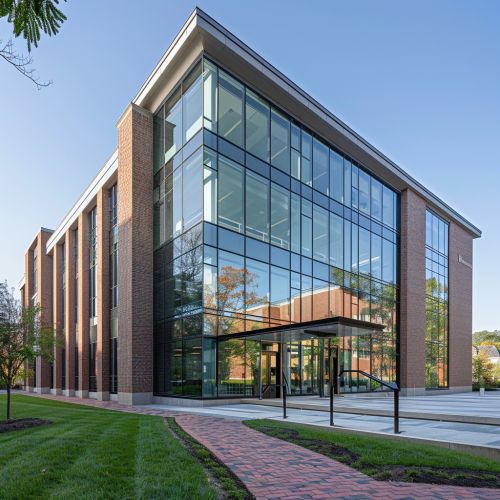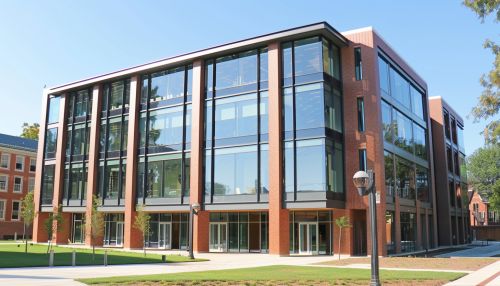Wharton School
History
The Wharton School of the University of Pennsylvania, commonly referred to as Wharton, was established in 1881 through a donation from Joseph Wharton, an American industrialist and philanthropist. It holds the distinction of being the world's first collegiate school of business. Wharton's founding vision was to provide a rigorous and comprehensive education in business and finance, aiming to produce leaders who could contribute to the nation's economic development.
Wharton's early curriculum focused on a blend of theoretical and practical knowledge, incorporating courses in economics, law, and finance. Over the decades, the school expanded its academic offerings and research initiatives, becoming a pioneer in various fields such as Marketing, Management, and Entrepreneurship.
Academic Programs
Wharton offers a wide range of academic programs, including undergraduate, MBA, executive MBA, and doctoral degrees. The undergraduate program is highly selective, admitting students who demonstrate exceptional academic abilities and leadership potential. The MBA program is renowned for its rigorous curriculum, which includes core courses in finance, accounting, and management, as well as a wide array of electives.
The executive MBA program is designed for working professionals who seek to advance their careers while continuing to work. This program offers the same rigorous curriculum as the full-time MBA but is delivered in a format that accommodates the schedules of busy executives.
The doctoral programs at Wharton are research-intensive and designed to prepare students for academic careers. These programs cover various disciplines, including finance, marketing, operations, and information management.
Research Centers and Initiatives
Wharton is home to numerous research centers and initiatives that contribute to the advancement of knowledge in various fields of business. Some of the prominent research centers include:
- The Wharton Risk Management and Decision Processes Center: Focuses on risk assessment, risk management, and decision-making processes.
- The Wharton Customer Analytics Initiative: Specializes in the application of data analytics to understand consumer behavior and improve marketing strategies.
- The Wharton Social Impact Initiative: Aims to promote social impact through business practices and research.
These centers collaborate with industry partners, government agencies, and other academic institutions to conduct cutting-edge research and provide valuable insights into complex business challenges.
Faculty and Alumni
Wharton's faculty comprises distinguished scholars and practitioners who are leaders in their respective fields. The faculty's expertise spans a wide range of disciplines, including finance, marketing, management, and operations. Many faculty members have received prestigious awards and recognition for their contributions to academia and industry.
Wharton's alumni network is one of the most influential and extensive in the world. Graduates of Wharton have gone on to become leaders in various sectors, including finance, consulting, technology, and entrepreneurship. Notable alumni include Donald Trump, former President of the United States, and Elon Musk, CEO of Tesla and SpaceX.
Campus and Facilities
Wharton's campus is located in Philadelphia, Pennsylvania, and is part of the University of Pennsylvania's larger campus. The school boasts state-of-the-art facilities, including modern classrooms, advanced research labs, and collaborative spaces designed to foster innovation and learning.
One of the key facilities is the Huntsman Hall, a 320,000-square-foot building that houses classrooms, lecture halls, and study spaces. The building is equipped with cutting-edge technology to support interactive learning and collaboration.
Global Reach and Partnerships
Wharton has a strong global presence, with partnerships and collaborations with leading business schools and institutions around the world. The school offers various global programs, including international exchange programs, global modular courses, and international study tours.
These programs provide students with opportunities to gain global business perspectives, engage with diverse cultures, and develop a deeper understanding of international markets. Wharton's global initiatives also include research collaborations and joint academic programs with institutions in Europe, Asia, and Latin America.
Admissions and Financial Aid
Wharton's admissions process is highly competitive, with a holistic review of applicants' academic achievements, professional experiences, leadership potential, and personal qualities. The school seeks to admit students who demonstrate a strong commitment to academic excellence, leadership, and community engagement.
Financial aid is available to eligible students in the form of scholarships, grants, and loans. Wharton is committed to making its programs accessible to talented individuals from diverse backgrounds and offers various financial aid options to support students' educational pursuits.
See Also
- Harvard Business School
- Stanford Graduate School of Business
- Kellogg School of Management
- MIT Sloan School of Management
- Columbia Business School


